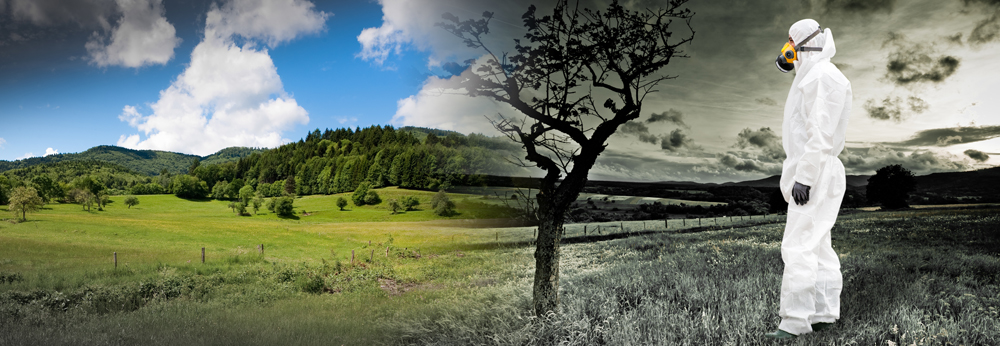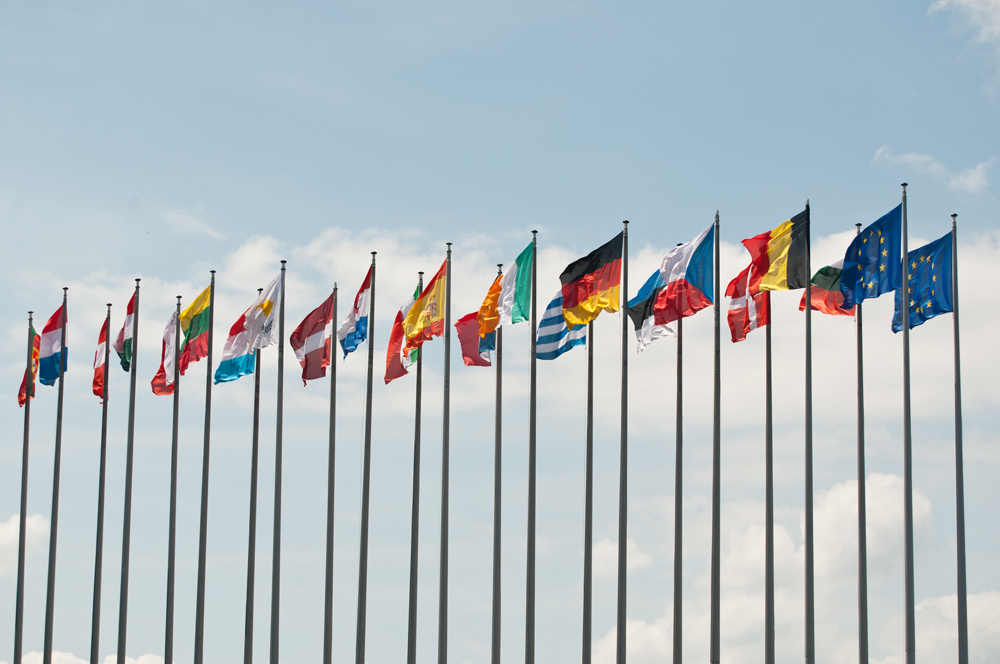I confess: the European Union is my great love!
It was not love at first sight, nor a blind, hot passion, but a grown, deep and profound love. A love which I am ready to defend and fight for.
As a conservationist of the Hainburg generation I was not a fan of this obscure and little-known construct in distant Brussels in 1994 when Austria decided on whether to join the EU. I saw accession more as a danger to my concerns for nature, animal and environmental protection than as an opportunity.
But then I moved to Brussels as an environmental lobbyist and got to know, appreciate and love the EU.
Only experience makes you know
It was the late 1990s, when a broad range of NGOs from all sectors worked to raise a social Europe with high standards in nature and environmental protection, as well as in areas such as public health, consumer protection, labour rights and much more. A European Economic Community (EEC), in which the interests of corporations weighed heaviest, was gradually imposed with a system of rules that set limits to these industrial interests – for the benefit of the general public. Only a united Europe representing around half a billion people was and is able to counter large global corporations. A small country like Austria benefits enormously from being part of a big whole.
My main topic at that time was genetic engineering. The European Parliament was just about to adapt the EU laws to the new technologies and create a set of rules on how, for example, the applications of agrochemical companies for the release of genetically modified plants should be dealt with. Some of my direct opponents in the lobbyists’ fight for MEPs’ attention were Monsanto’s representatives, who wanted to put their genetically modified plants on the European market as unchecked and unhindered as possible, just as they had been able to do in North and South America. But they were not prepared for a democratic Europe with a strong and well-organised civil society.

Monsanto is many times stronger than little Austria. If Austria had not been part of the EU, Monsanto would have had an easy time in the 1990s obtaining national approvals for its genetically engineered maize – regardless of the petition for a referendum on genetic engineering (see the most recent example of how petitions for a referendum are dealt with in Austria: the ‘Don’t Smoke’ petition).
But Monsanto had and still has to submit their applications for approval of its genetically modified plants to the EU authorities, which had to decide according to the newly created rules (EU laws). And these rules are the strictest in the world – thanks to the campaigns and political lobbying of the European environmental associations in Brussels. After years of hard work, we managed to get the European Parliament to introduce strict licensing rules that are still in force today. I myself was on the front line at the time and can still remember very well the frustration of the staff at Monsanto & Co. They were used to make themselves at home in ministerial offices all over the world, without the general public even being able to notice. Now, however, they had to explain themselves in public committees of the European Parliament and to deal with the arguments of their opponents. Suddenly the name Monsanto became known to the public. For the first time in its history, Monsanto had to learn that they couldn’t make the rules themselves. Monsanto’s head office in the USA was flabbergasted and replaced their chief lobbyists in Brussels several times in quick succession – but in vain. Largely, the EU was a nut too hard to crack for the agrochemical giant. To this day, hardly any genetically engineered plants are growing in Europe’s fields!

Civil society has also achieved similar success in other areas. In nature conservation, the Water Framework Directive and the Natura 2000 Directives created high standards that are valid throughout Europe; other colleagues made REACH set a strict legal framework for the potent chemical industry for the first time; consumer rights were strengthened, public health policy was sharpened against the will of the tobacco industry, and so on. The “Europe of Corporations” had become more friendly to people and the environment.
Of course, not all of our projects were successful, and we often would have liked to see better or stricter rules – but what we achieved was many times more than we would have been able to achieve at any national level! In the European Parliament, due to the high level of transparency, the forces between industries and civil society associations were more balanced than they ever were or now are at national level.
These and similar achievements are now seriously threatened by efforts of nationalist parties to reduce the Union to a mere free trade area for the exclusive benefit of industry interests. “Over-regulation” is the misleading battle cry for attempts to eliminate provisions which serve the public interest and had been very hard to achieve.
In order to prevent this, these destructive, nationalist anti-EU parties must not gain a majority in the upcoming elections to the European Parliament!
Model in terms of democracy!
In order to gain voters’ support, these nationalist parties crank up prejudices against the “Eurocrats in Brussels”. These prejudices are based on ignorance, misinformation and plain lies. One of the main arguments alleges that the EU was undemocratic, illegitimate and nothing but a bureaucratic apparatus. This picture, tirelessly repeated by the nationalists, is simply wrong!
In truth, no national parliament is as democratic, transparent and powerful as the European Parliament (EP) in Strasbourg and Brussels. This is mainly due to the fact that the EP does not have to back a government and therefore is free from party discipline. While in Austria the members of the governing parties always vote unanimously for a government bill (and the opposition members usually vote unanimously against it), in the EP the members can vote free from party discipline. The results of these free votes are therefore often unpredictable! While in a national parliament all members of a parliamentary group vote alike, in the EP this usually differs depending on the country of origin, but often also on the attitude or opinion of the individual MEPs. In the EP, persuasiveness of arguments often weighs more than party affiliation. At the end of a long legislative process, we lobbyists await the results: How many votes for or against an amendment would we get? These are often the most exciting moments of a lobbyist’s life. Pure democracy.
The European Parliament is a working parliament which actually forms laws. National parliaments more or less rubber-stamp government bills. The EP, by contrast, often fundamentally changes the Commission’s proposals. Rarely does what comes in resemble what comes out in the end. There have also been cases when the EP plainly rejected legislative proposals of the Commission and brought them down against the will of the Council.

It is often criticised that the EP does not have the right to directly place a bill. The so-called legislative initiative is in fact the exclusive responsibility of the Commission. This could be changed, but one should bear in mind that even national parliaments hardly ever initiate laws by themselves, but usually only deal with and approve the government’s legislative proposals. Besides, the EP can at any time call on the Commission to draft a bill.
The EP is also transparent and open. Observers and lobbyists (including those from civil society) have straightforward access to MEPs, can follow debates and votes in committees and in plenary directly and immediately, make proposals and exchange arguments. In the EP, it’s about factual policy; it is not a TV show like the Austrian Parliament, where the main aim is to get media attention through juicy speeches. Instead, EP committees hear experts, write legal texts, struggle for paragraphs or amendments, seek compromises and find them.
The European Parliament thus shapes laws in an open, transparent and free way, like it should be in a parliamentary democracy. The widely spread idea that the EP had no power has become a myth at the latest in 1992, when the Maastricht Treaty created the EU in its present form. There’s no way around the will of the EP.
The much-quoted “democratic deficit” of the EU Commission is another fairy tale, which does not become more correct the more often it is repeated. Yes, the commissioners (“ministers”) are not directly elected representatives – just as the ministers of a national government are not directly elected. However, unlike many national ministers, Commissioners must be approved by Parliament before they can take office. And the Commission can act only in accordance with the laws enacted jointly by the directly elected European Parliament and the member states (Council). Nevertheless, the EU opponents like to scold the “evil” Commission, which wants to impose all kinds of regulations on “us”. The nationalists and self-proclaimed “patriots” no longer want to put up with this. This populist posing is deeply untrustworthy – you don’t call the housekeeper names when he implements the decisions of the house community.

Many other “horror stories” buzz around the EU and usually are simply not true. One example is the infamous “Bent Cucumber Regulation”. If one asks an EU citizen about the EU, then inevitably the argument comes, the EU would “even dictate the curvature of cucumbers”. But that’s utter nonsense, there never was a regulation on how cucumbers must be curved. In reality there was a classification of cucumbers according to the degree of curvature, no different than chicken eggs are classified and packaged according to size classes! This serves above all to protect consumers, who can rely on having only eggs of the same size in one package. In the case of cucumbers, it was about preventing that cucumbers with different curvatures in one box lead to empty space, thereby selling “air” to consumers!
There is not enough room here to tell and disprove all the countless other anti-EU fairy tales. It is a fundamental error of many laymen to believe that only the EU “bureaucratic castle” would issue standards and regulations. In reality, without the EU, the individual member states would issue the standards and regulations themselves, but each country would do so on its own. This would amount to a twenty-eightfold increase in administrative expenditure, and the result would be worse. And it would open the door again for industrial lobbyists to impose their wishes unhindered by playing the states off against each other or simply blackmailing smaller countries. The above-mentioned frustrated representatives of Monsanto – together with all their colleagues from different industries, whether pharmaceutical, tobacco or car – would like nothing better than a weakened EU. The weaker the EU, the easier it will be for industry lobbyists to set the rules and bring their products to market unhindered and uncontrolled – often to the detriment of consumers, the environment and animal welfare.
A haven of peace in an unstable world
Just over 70 years ago, trenches, walls and barbed wire separated the peoples of Europe, even cutting through countries and cities, including Austria and Vienna. Today we travel in our small, narrow, but very rich continent free from borders, from the Arctic Circle to Sicily, from Lisbon on the Atlantic to Constanţa on the Black Sea, and pay with a single, globally appreciated currency, our Euro!
This historic achievement alone should be enough to make the meaning and infinite advantages of a united Europe clear to everyone. Who wants to put peace at stake or just spend hours at the border in traffic jams again?
Curiously enough, it is the generation of my parents, born in or shortly after the Second World War, that poses the greatest risk. Thanks to the EU, which was invented as a project of peace, they spent their lives in peace and were therefore able to build up unprecedented prosperity. A success unique in the world. But now it is mainly this generation of beneficiaries that falls for the nationalist pied pipers. The old and the uninformed have inflicted Brexit on the British, a country’s voluntary self-punishment of historic dimensions. Let’s see to it that the forthcoming European elections do not bring the same dazzlers and liars in the position to inflict such damage on the rest of Europe, too. For long enough we have left the media coverage to the negativists and destroyers. It is time for the supporters of a united, strong Europe to raise their voices. We have the arguments, we have the historical proof and we have a positive outlook for the future.

Let us proudly share the achievements of the EU. It is not only the peace project that is impressive. Even the fact that an economic community today has strict rules is not a matter of course, but the result of a highly positive development – and we should try to preserve that. Let us be glad that we in the EU can agree on regulations that seek to reduce the energy consumption of light bulbs, vacuum cleaners and refrigerators throughout Europe! The result proves us right: Europe is the only region in the world where CO2 emissions are currently falling slightly (in Austria, by the way, they are rising!). It is therefore absurd for people for whom climate protection is important to simultaneously “oppose” the EU and vote for right-wing nationalist parties who always vote against any climate protection measures in the European Parliament.
It is just as absurd for people who eagerly sign petitions against free trade agreements like TTIP to elect nationalist parties at the same time, who want to transform the EU back into a free trade zone in which predatory capitalism has the say.
It is absurd for people who oppose genetically modified plants in Europe to advocate weakening the very EU that managed – against the will of the agricultural and pharmaceutical lobby – to enact the world’s strictest genetic engineering laws.
It is absurd for people who care about nature conservation to want to destroy the EU which ensures that national governments comply with EU nature conservation requirements.
It is absurd for people afraid of unregulated immigration to be opposed to a unified, strong EU, which, as part of world politics, could help prevent people from having to flee their homes in the first place.
Yes, because in world politics, too, only a united EU has the weight to achieve our goals. Not only would individual miniature countries like Austria have absolutely nothing to say, but it is also true that the EU is stronger than the sum of its members.
It is significant that Trump’s USA see the EU as an “opponent”. It is revealing that Putin’s Russia actively supports and strengthens anti-EU parties in Europe. Both governments see a weakened EU as advantageous for themselves. Vice versa, a strong EU is good for Europe and for us Europeans.
Member states and parties that endanger or weaken the internal cohesion of the EU are thus harming us all!
Lets be proud of the best continent ever!
The European Union is rightly regarded throughout the world as a role model for over 70 years of peaceful development, strong consumer and environmental protection and, in general, a humanist attitude and robust democratic institutions. That is why I am proud to be European! And I stand up for the preservation of this Europe! We need more love for Europe. We need more EU, not less. We need a European Parliament full of positive MEPs. I will therefore vote for those parties that stand up for a strong and self-confident Europe and whose candidates want to make a positive contribution to the further development of this Europe with passion and confidence.
Because I love my Europe. Yes, I #loveyouEU
Thomas Gernot, former environmental lobbyist in Brussels for Austrian and European environmental and nature conservation associations



Dear Thomas, as a foreigner living here in Europe, I regard the EU as one of the greatest and most durable expressions of peace the world has experienced. You have succinctly captured how important it is for people to get out and vote in for parties that believe passionately in this ongoing durability. Congratulations on your thoughtful and thought provoking words. If for one, am proud of the EU, for what it stands for, for the welcoming it has given to me, and for the opportunities it will continue to give my family into the future.
Luke, we fully agree with you. Would be wonderful if you share Thomas’ article and be part of the #loveyouEU initiative. You might want to subscribe to our e-newsletter, if you haven’t done so yet. Have a wonderful weekend.
A very, very pleasing declaration of love for Europe, which I fully share. I lost my father and two uncles in the most terrible of wars. I waited for hours at the borders until I was allowed to move from one European country to another. The EU has made sure that nobody like me has to go to the shelter. I heard the detonation of the bombs raining from the sky, with my teddy bear in my arms, full of fear and tears. That alone is worth all the mistakes the EU certainly has. It is a mystery to me how nationalism, which brought Europe the greatest disaster of all time, can be preferred to the European cooperation and integration that has brought us decades of peace and prosperity.
Gustav, your comment is very moving. Please keep sharing your experience and thoughts. There is a momentum for increasing discussions, share of information experience and new ideas coming in. We have to move towards a new dialogue, positive, fresh, based on experience and facts and learning from the past to do better. The European Union is a project constantly evolving and it is us to make it even better. Thanks for your support and being outspoken.